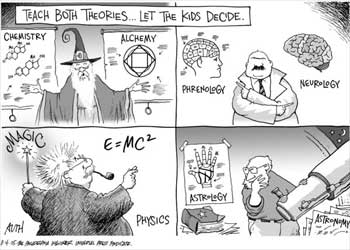
Believers minds are webs of “interconnected” information that all point toward the truth of every other thing they believe, whether hypothetical or historical, whether seen or unseen, concerning this world or the next. There are no sliding scales of probabilities concerning any of their beliefs in particular. Instead, everything is “related” to everything else, and “proves” it.
Doubters have no way to “crack open” such a tightly sealed circular bubble or egg of “reasoning.” That is also why believers insist, “Accept it all, accept my holy book and my interpretation, my church, and my views of the seen and unseen worlds, or skip heaven and suffer eternally.”
To put it another way, a believer asserts the Bible is holy, infallible, inerrant or perfect, and a particular interpretation of it by his church is equally so, and the interpretation coincides with an unseen reality, say the Trinity, which they insist exists.
But a doubter looks at the plausibility of claims piled on claims, beginning with the claim of a holy or infallible book, continuing with the claim of a particular church's holy or infallible interpretation of that book, and ending with claims of knowing the final unseen reality. The doubter points out how the unknowns and/or the improbabilities continue to rise along the way.
Let's consider a particular case, “The Trinity.” Believers begin with a book like the Bible and assert it is holy, infallible or inerrant. Next they assert that a particular interpretation of that book is likewise, holy, infallible or inerrant, and they find the “Trinity” in that book by emphasizing particular verses and interpretations of those verses, and downplaying questions raised by other verses. For instance, the Jews wrote and possessed over half the Bible for centuries yet never came to believe in the Trinity, but instead came to believe and stress that “the Lord our God is one God.” Trinitarian Christians (there are non-Trinitarian Christians by the way) claim that God let them know the “truth” about “the Trinity” in the “New Testament,” while the Jews only had part of the “truth” in the “Old Testament.” The doubter wonders whether God neglected to tell the Jews the “truth,” and if so, why, and if the answer to that question is not also unproven or doubtful. The doubter also wonders whether some human beings merely invented newer interpretations and newer religious ideas over time. Even in the N.T. the books do not agree as to what Jesus's connection with God or divinity is, because the earliest three Gospels, which are presumably our earliest preserved stories about Jesus, don't directly promote the idea that Jesus was “God,” and it remains unclear exactly what the historical Jesus himself believed, since even those earliest three Gospels are partisan documents and contain later interpretations of Jesus. James D. G. Dunn a moderate evangelical, agrees with many mainstream scholars that it is doubtful that the historical Jesus considered himself to be the Messiah, and that none of the teachings of sayings of Jesus in the fourth Gospel are historic.
There is an old story of a missionary trying to convert an Indian. The Indian made a little circle in the sand and said, “That is what the Indian knows.” Then he made another circle a little larger and said, “That is what missionary knows, but outside there the Indian knows just as much as missionary.”
—Robert Ingersoll


No comments:
Post a Comment